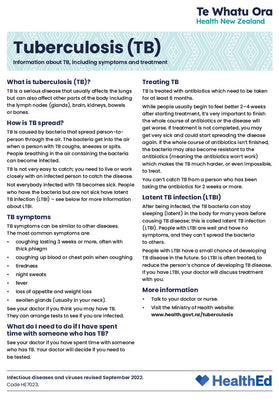Tuberculosis (TB) - HE7023

Information about tuberculosis (TB), including symptoms and treatment
The full resource:
What is tuberculosis (TB)?
TB is a serious disease that usually affects the lungs but can also affect other parts of the body including the lymph nodes (glands), brain, kidneys, bowels or bones.
How is TB spread?
TB is caused by bacteria that spread person-to-person through the air. The bacteria get into the air when a person with TB coughs, sneezes or spits. People breathing in the air containing the bacteria can become infected.
TB is not very easy to catch; you need to live or work closely with an infected person to catch the disease.
Not everybody infected with TB becomes sick. People who have the bacteria but are not sick have latent TB infection (LTBI) – see below for more information about LTBI.
TB symptoms
TB symptoms can be similar to other diseases. The most common symptoms are:
- coughing lasting 3 weeks or more, often with thick phlegm
- coughing up blood or chest pain when coughing
- tiredness
- night sweats
- fever
- loss of appetite and weight loss
- swollen glands (usually in your neck).
See your doctor if you think you may have TB. They can arrange tests to see if you are infected.
What do I need to do if I have spent time with someone who has TB?
See your doctor if you have spent time with someone who has TB. Your doctor will decide if you need to be tested.
Treating TB
TB is treated with antibiotics which need to be taken for at least 6 months.
While people usually begin to feel better 2–4 weeks after starting treatment, it’s very important to finish the whole course of antibiotics or the disease will get worse. If treatment is not completed, you may get very sick and could start spreading the disease again. If the whole course of antibiotics isn’t finished, the bacteria may also become resistant to the antibiotics (meaning the antibiotics won’t work) which makes the TB much harder, or even impossible, to treat.
You can’t catch TB from a person who has been taking the antibiotics for 2 weeks or more.
Latent TB infection (LTBI)
After being infected, the TB bacteria can stay sleeping (latent) in the body for many years before causing TB disease; this is called latent TB infection (LTBI). People with LTBI are well and have no symptoms, and they can’t spread the bacteria to others.
People with LTBI have a small chance of developing TB disease in the future. So LTBI is often treated, to reduce the person’s chance of developing TB disease. If you have LTBI, your doctor will discuss treatment with you.
More information
- Talk to your doctor or nurse.
- Visit the Ministry of Health website: www.health.govt.nz/tuberculosis
HE7023